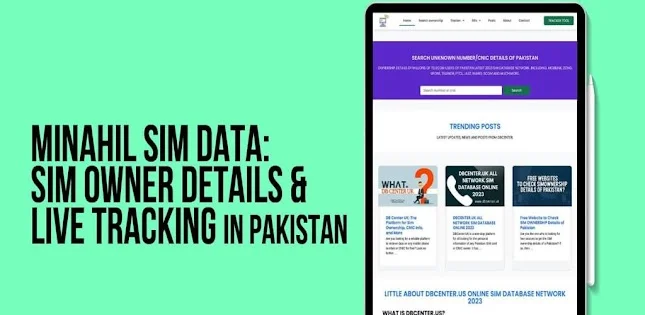Many websites claim you can look up a phone number and instantly see the SIM owner’s name, CNIC, address, and live GPS location. That sounds convenient, but it’s not how legitimate systems work in Pakistan. This guide explains, in simple terms, what “SIM database online” really means, what you can legally do, how live location sharing actually works, and safer alternatives for individuals and businesses.
What People Mean by “SIM Database Online”
When people say “SIM database online,” they usually mean a website that promises to reveal private details about a number’s owner. In reality:
- There is no public, legal database in Pakistan that shows another person’s name, CNIC, address, or live location just by entering a phone number.
- Telecom operators and government agencies protect this data under strict laws. Access requires due legal process.
- Sites claiming “free owner lookup with GPS” are often inaccurate, illegal, or unsafe.
The Legal Reality in Pakistan
- Personal data (name, CNIC, address, location) is protected. Only the mobile operator and authorized authorities can access it for legitimate reasons.
- Lawful access requires formal requests by law enforcement, typically during investigations or emergencies.
- Public tools that expose identities or live locations of other people violate privacy and can put users at legal risk.
What You Can Legitimately Check
There are safe, legal ways to manage your own SIM information:
- Check SIMs on your CNIC: Use the SIM Information service to see how many SIMs are registered against your own CNIC. If you find unknown SIMs, request deactivation via your operator.
- Verify your account: Your carrier’s app can confirm the owner name, package, and services for numbers under your CNIC.
- Report abuse: If you receive threats, scams, or harassment, file a complaint with your operator and the PTA Complaint Management System. For serious cases, contact local police or the FIA Cyber Crime Wing.
Live Location: How It Works (and What You Can’t Do)
- GPS live tracking requires consent. A device must actively share its location via an app or a dedicated tracker installed with a registered SIM.
- Consumer options:
- Google Maps: Location Sharing lets a user share their live location with selected contacts for a chosen time.
- WhatsApp Live Location: Share your own location inside a chat for 15 minutes, 1 hour, or 8 hours.
- Apple Find My: For iPhone users who opt in.
- You cannot type someone’s number into Google Maps or a website and see their live location. That’s a myth.
- Only law enforcement, through legal process, can request network-based location from operators.
Why “Free Number Lookup with GPS + CNIC” Sites Are Risky
- Illegal access: Publishing identities and locations without consent breaches privacy laws.
- Inaccurate data: Aggregated or fabricated records lead to false accusations and harm.
- Scams and malware: Many sites harvest your data, inject ads, or spread malicious apps.
- Identity theft: Uploading your CNIC or phone details can expose you to fraud.
- No accountability: These services have no credible privacy policy, security audits, or support.
Responsible Business Use: Tracking with Consent
For companies, tracking can be legitimate when done right:
- Fleet and asset tracking: Install PTA-compliant GPS devices in company-owned vehicles/equipment. Use a registered SIM and a reputable platform.
- Clear policies and consent: Inform employees that company assets are tracked during work hours. Limit personal data collection.
- Security practices: Enforce strong passwords, two-factor authentication, role-based access, and data retention limits.
- Compliance: Follow local laws, labor policies, and privacy best practices.
Switched-Off Phones and Other Limits
- If a device is powered off or has no signal, consumer apps can’t provide live location. Some trackers may show the last known point when it was online.
- GPS struggles in underground areas, tunnels, or dense urban canyons.
- Battery-powered trackers need regular charging; wired vehicle trackers need proper installation.
- Data connectivity is required for “live” updates; some devices store data offline and upload later.
Safer Alternatives to “Owner Lookup”
- For unknown calls: Block the number, enable spam filters, and report it to your operator.
- For emergencies: Share your own live location with family or call local emergency services.
- For verifying identity: Ask contacts to share limited info directly (e.g., business name, website, official email) or use verified business directories.
- For parents/guardians: Use consent-based family tracking features on reputable apps.
How to Protect Your SIM and Personal Data
- Set a SIM PIN and keep the PUK safe.
- Enable a port-out PIN with your carrier to prevent SIM-swap fraud.
- Use app-based two-factor authentication where possible (rather than SMS codes).
- Keep your phone OS and apps updated.
- Avoid entering your CNIC or phone number on untrusted websites.
- Review privacy settings on apps that can access your contacts and location.
FAQs
- Can I see a SIM owner’s name and CNIC by number?
No. That data is private. Only operators and authorities can access it under strict rules. - Can I track someone by typing their number into a website?
No. Legitimate tracking requires consent via an app or a device you own. Sites promising this are unsafe or illegal. - Is it legal to track employees?
Tracking company-owned assets can be legal when transparent, consent-based, and compliant with privacy laws. Secret tracking is not acceptable. - Can I track a phone that’s switched off?
Not live. You might see the last known location if the device had shared it before going offline. - What’s the official way to check SIMs on my CNIC?
Use the PTA SIM Information service to view how many SIMs are registered to your CNIC and request corrections via your operator.
Conclusion
There’s no legal, public “SIM database online” that reveals another person’s name, CNIC, address, or live GPS location. Those claims are misleading and risky. What you can do, safely and lawfully, is manage your own SIMs, use consent-based live location sharing with trusted contacts, and deploy reputable tracking solutions for company-owned assets. If you face scams or harassment, use official complaint channels and, when needed, law enforcement. Done right, technology can improve safety and accountability without putting anyone’s privacy at risk


 SIM OWNER DETAILS
SIM OWNER DETAILS